
By Pablo Jaime Sáinz
Twelve year old Emily de la Rosa is fluent in three languages: English, Spanish, and American Sign Language. She uses the first two in school and with her friends, but she only uses American Sign Language with her parents: Both of her parents are deaf.
In fact, she and her siblings serve as interpreters for their parents.
“Kids at school have never made fun of me because my parents can’t hear nor speak,” said a smiling Emily before her soccer game at a field in Barrio Logan. “They actually tell me it’s pretty cool that I know sign language.”
Her father, Juan de la Rosa, was born deaf in Guadalajara. Her mother, Maria, became deaf as a baby after suffering from an ear infection. Emily is the youngest of five siblings. All of them can hear, and have learned sign language since they were little children to be able to communicate with their parents.
They are the ones who interpret for them at home, at school during meetings with their teachers, and on the streets.
Juan de la Rosa works as a maintenance worker at a local school. He said, through an interpreter, that although it was hard raising five children being deaf, he and his ex-wife were able to do it, with lots of patience and hard-work.
“It was difficult to communicate with the children at first, but then they started learning sign language and that helped us a lot,” said De la Rosa, who is 54. “But our children were always helping us and helping each other.”
But De la Rosa said that his family was just like many families in Barrio Logan: Both parents worked hard to give the best for their children, always making sure they were in school, trying to better themselves.
De la Rosa moved to the United States almost 30 years ago, looking for better opportunities, because, he said, in Guadalajara he suffered much discrimination for being deaf.
“It was going to be very tough there, so I moved here,” he said. “Although here it hasn’t been easy either, I’m able to have a good job to support my family. Here my children can have a better future, even if their parents are deaf.”
De la Rosa’s youngest daughter plays in a girls’ soccer team in Barrio Logan. He is always there to support her, during trainings, at the games, cheering with his hands when she scores a goal.
“My dad always supports me,” she said. “He looks after me.”
De la Rosa’s oldest daughter, Evelyn Pulido, said that she always felt proud of her parents, for being able to overcome their disability.
“I was never ashamed,” she said. “Other children would make fun of me, but I would tell them that I was proud of being able to know sign language and help my parents.”
Pulido said that her own children have also learned sign language and that they love their grandparents.
“I tell them that they should always feel proud of their grandparents, that they are normal grandparents like anybody else,” said Pulido, who is 29.
For most fathers, hearing the voice of their little one calling them “daddy” for the first time is a blessing and an unforgettable moment. De la Rosa said that for him, that moment was when his oldest daughter, Evelyn, signed “daddy” with her little hands.
“I felt like every father feels: Loved, proud,” he said.